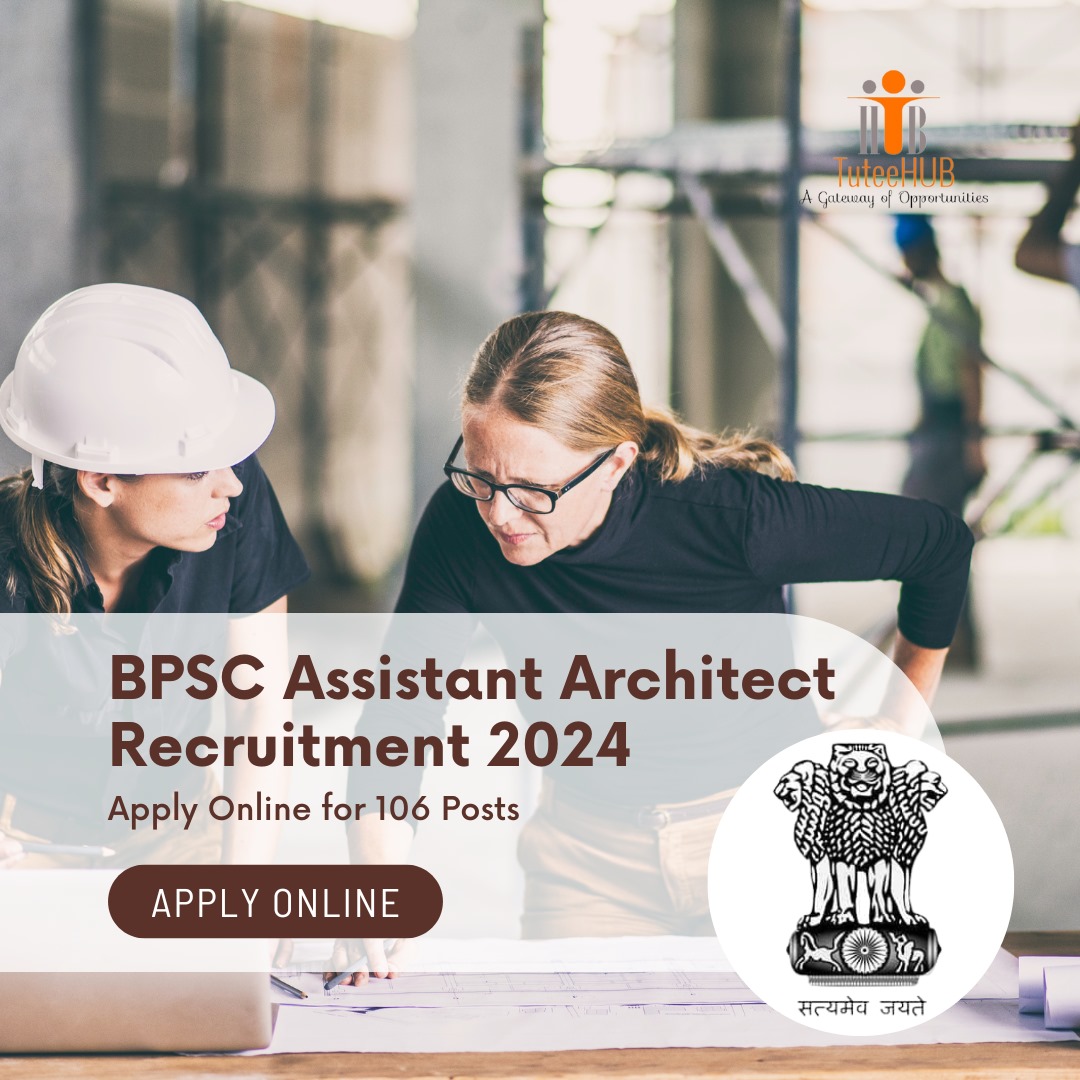BPSC Assistant Architect Recruitment Tutorial

Overview
The Bihar Public Service Commission (BPSC) is responsible for conducting the Assistant Architect recruitment exam to select qualified candidates for various positions within the Bihar state government. This chapter provides a comprehensive overview of the BPSC Assistant Architect recruitment process, eligibility criteria, application procedure, and selection procedure.
1.2 Eligibility Criteria
To be eligible for the BPSC Assistant Architect recruitment, candidates must meet the following criteria:
- Educational Qualification: Candidates must hold a Bachelor's Degree in Architecture from a recognized university. The university must be approved by the Council of Architecture (CoA).
- Age Limit: Candidates must be between 21 and 37 years of age as of 1st January of the year of advertisement. There may be age relaxations for reserved categories as per government norms.
- Nationality: Candidates must be Indian citizens.
- Physical Standards: Candidates must meet the prescribed physical standards set by the government for the post of Assistant Architect.
1.3 Application Procedure
The application form for BPSC Assistant Architect recruitment is typically released on the official website of BPSC. Interested candidates can follow these steps to apply:
- Registration: Candidates need to register on the BPSC website to create an account.
- Fill out the Application Form: After registration, candidates can access and fill out the online application form. They must provide personal, educational, and contact details accurately.
- Upload Documents: Candidates must upload scanned copies of required documents, such as educational certificates, age proof, caste certificate (if applicable), and passport-size photograph.
- Submission: Once the form is complete, candidates must submit it along with the prescribed application fee. The fee can be paid online through various modes such as debit card, credit card, or net banking.
1.4 Selection Procedure
The BPSC Assistant Architect recruitment process consists of two stages:
- Written Examination: The written examination is an objective-type exam that tests candidates' knowledge and skills in various subjects related to architecture. The syllabus is typically based on the curriculum of the Bachelor's Degree in Architecture.
- Interview: Shortlisted candidates from the written examination are called for an interview. The interview panel assesses candidates' communication skills, technical knowledge, problem-solving abilities, and overall suitability for the role of Assistant Architect.
1.5 Preparation Tips
To prepare effectively for the BPSC Assistant Architect recruitment exam, candidates can follow these tips:
- Thoroughly Understand the Syllabus: Familiarize yourself with the official syllabus and focus on understanding the key concepts and topics.
- Practice Objective-Type Questions: Solve numerous objective-type questions from previous years' papers and mock tests to improve your speed and accuracy.
- Refer to Standard Textbooks and Study Materials: Utilize standard architecture textbooks and study materials to strengthen your conceptual understanding.
- Attend Coaching Classes (Optional): Consider joining coaching classes to gain guidance from experienced professionals and access quality study material.
- Stay Updated on Architectural Trends: Keep yourself informed about the latest advancements and trends in the field of architecture.
- Maintain Physical Fitness: For the physical standards test, engage in regular physical activity and ensure you meet the specified requirements.
By following these steps and preparing diligently, candidates can improve their chances of success in the BPSC Assistant Architect recruitment process and secure a position within the Bihar state government.
FAQs
Q: Who conducts the BPSC Assistant Architect recruitment exam? A: Bihar Public Service Commission (BPSC)
Q: What is the minimum educational qualification for the BPSC Assistant Architect post? A: Bachelor's Degree in Architecture from a CoA-approved university
Q: What is the age limit for BPSC Assistant Architect recruitment? A: 21 to 37 years, with age relaxations for reserved categories
Q: What is the selection procedure for the BPSC Assistant Architect post? A: Written examination followed by an interview
Q: How can I apply for the BPSC Assistant Architect post? A: Register on the BPSC website, fill out the application form, upload documents, and submit the application along with the fee
Q: What is the syllabus for the written examination? A: Based on the curriculum of the Bachelor's Degree in Architecture
Q: Can I prepare for the BPSC Assistant Architect recruitment exam on my own? A: Yes, by thoroughly understanding the syllabus, practicing objective-type questions, and referring to standard textbooks and study materials
Q: Is there a physical standards test for the BPSC Assistant Architect post? A: Yes, candidates must meet the prescribed physical standards set by the government
Q: What are some tips for preparing for the BPSC Assistant Architect recruitment exam? A: Understand the syllabus, practice objective-type questions, refer to standard textbooks, consider coaching classes, stay updated on architectural trends, and maintain physical fitness
Q: What is the tenure of the BPSC Assistant Architect post? A: Not provided in the given text
Start TutorialTutorials are for educational purposes only, with no guarantees of comprehensiveness or error-free content; TuteeHUB disclaims liability for outcomes from reliance on the materials, recommending verification with official sources for critical applications.
Similar Tutorials

Advanced Excel Charts Tutorial: How to Create Prof...
Learn how to create professional charts in Excel with our advanced Excel charts tutorial. We'll show...

Advanced Excel Functions: Tips and Tricks for Boos...
Are you tired of spending hours working on Excel spreadsheets, only to find yourself stuck on a prob...

Apache Flume Tutorial: An Introduction to Log Coll...
Apache Flume is a powerful tool for collecting, aggregating, and moving large amounts of log data fr...
Explore Other Libraries
Related Searches
Please allow ads on our site
Kindly log in to use this feature. We’ll take you to the login page automatically.
Login
Join Our Community Today
Ready to take your education and career to the next level? Register today and join our growing community of learners and professionals.

Your experience on this site will be improved by allowing cookies. Read Cookie Policy
Your experience on this site will be improved by allowing cookies. Read Cookie Policy


Comments(0)